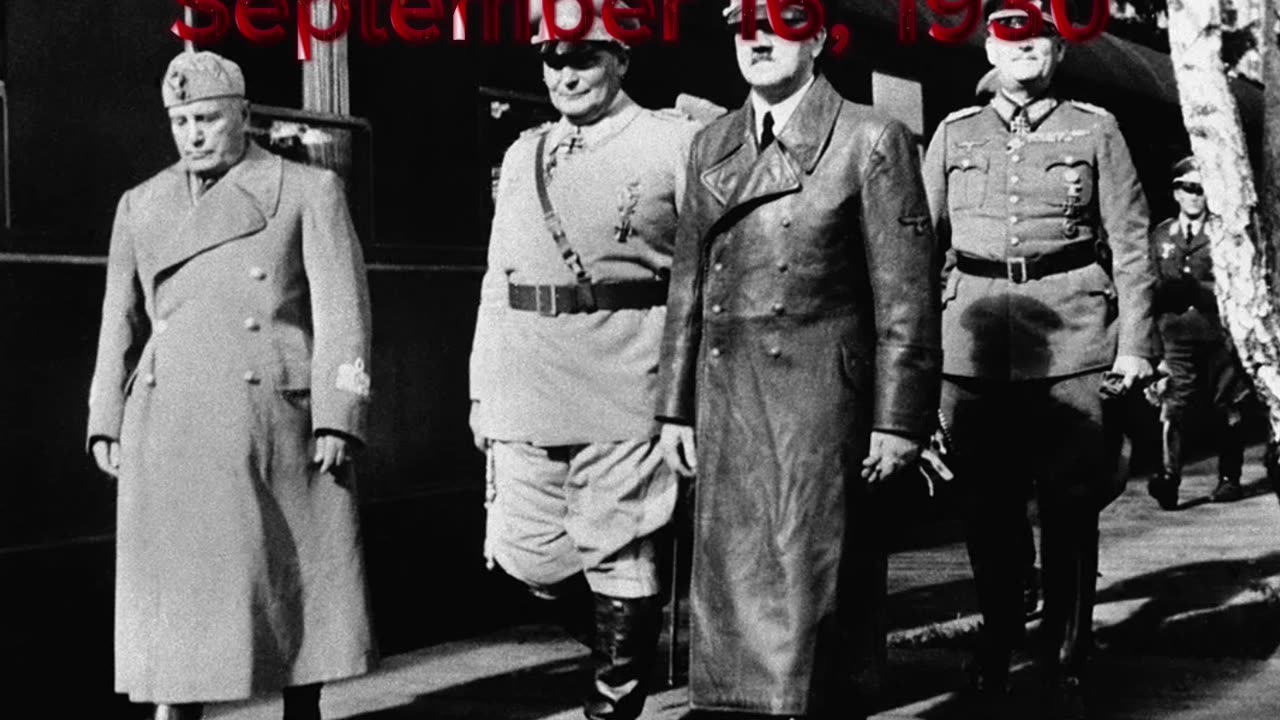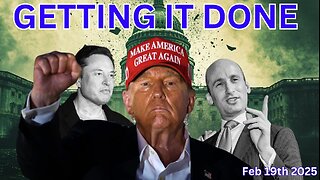Premium Only Content

Hitler's Speech in Munich - September 16, 1930
Background Leading Up to Hitler's Speech in Munich - September 16, 1930
Weimar Republic in Crisis: By 1930, the Weimar Republic was facing severe economic and political instability. The Great Depression had hit Germany hard, leading to massive unemployment and social unrest.
Nazi Party Gains: In the September 1930 Reichstag elections, the Nazi Party made significant gains, becoming the second-largest party in the Reichstag. This electoral success marked a turning point, bringing the Nazis into the national political spotlight.
Appeal of Nazi Ideology: The Nazi Party's promises of economic revival, national rejuvenation, and the overturning of the Treaty of Versailles resonated with many Germans who were disillusioned with the current government and desperate for change.
Key Points of Hitler's Speech:
Economic Recovery: Hitler emphasized the need for economic recovery, addressing the widespread unemployment and economic hardship facing Germany. He criticized the current government's inability to solve these issues and presented the Nazi Party as the only viable solution.
National Unity: A recurring theme in Hitler's speech was the call for national unity. He stressed the importance of all Germans coming together to overcome the country's challenges and to restore its former glory.
Critique of the Weimar Government: Hitler sharply criticized the Weimar government, accusing it of weakness, corruption, and betrayal of the German people. He argued that the government had failed to address the nation's economic and social problems.
Rejection of the Treaty of Versailles: Hitler reiterated his condemnation of the Treaty of Versailles, which he blamed for Germany's suffering. He promised to overturn the treaty and to restore Germany's territorial integrity and national pride.
Vision for Germany: Hitler outlined his vision for a strong, self-sufficient Germany. He spoke of rebuilding the nation's military, industry, and infrastructure, and of creating a society based on traditional German values.
Analysis:
Economic Focus: By focusing on economic recovery, Hitler aimed to address the immediate concerns of the German population. His promises of job creation and economic stability were designed to attract a broad base of support.
Nationalist Rhetoric: Emphasizing national unity and pride, Hitler sought to inspire a sense of collective identity and purpose. His vision for Germany's future was intended to resonate with those who felt disillusioned by the current state of the nation.
Critique of the Republic: Hitler's critique of the Weimar government was a strategic move to undermine its legitimacy and to position the Nazi Party as the only alternative capable of addressing Germany's crises. This critique was central to his appeal to voters.
Rejection of Versailles: By condemning the Treaty of Versailles, Hitler tapped into widespread resentment and anger among Germans who felt humiliated by the post-World War I settlement. This rejection was a key element of his nationalist agenda.
Mobilization of Support: The speech was designed to mobilize support for the Nazi Party by presenting it as the solution to Germany's problems. Hitler's call for unity and action was aimed at galvanizing his followers and attracting new supporters.
Overall, Hitler's speech on September 16, 1930, was a powerful articulation of his economic and nationalist agenda. It aimed to address the immediate concerns of the German population, critique the Weimar government, and mobilize support for the Nazi Party by presenting a vision of national revival and unity.
-
 LIVE
LIVE
The Dan Bongino Show
1 hour agoWhat Did Zelensky Know? When Did He Know It? (Ep. 2426) - 02/19/2025
102,990 watching -
 LIVE
LIVE
Steven Crowder
2 hours ago🔴 Fight! Major Lawsuit Announcement...
68,670 watching -

Timcast
1 hour agoDemocrats PANIC Over Trump Order To "Seize Control" Of Federal Agencies, Trump Asserts FULL Control
24K23 -
 LIVE
LIVE
MYLUNCHBREAK CHANNEL PAGE
16 hours agoA Little Help From Angels?
583 watching -
 LIVE
LIVE
LFA TV
15 hours agoLET'S KASH IN! | LIVE FROM AMERICA 2.19.25 11AM
3,321 watching -
 LIVE
LIVE
Caleb Hammer
30 minutes agoChildish Couple Won’t Stop Cheating On Each Other | Financial Audit
201 watching -
 23:18
23:18
Crowder Bits
3 hours agoDebunked: John Oliver's Outrageous Lies About Trump 2.0
8.43K16 -
 LIVE
LIVE
Matt Kohrs
11 hours agoMarket Open: Key Options Levels & Breaking News || The MK Show
1,398 watching -
 42:49
42:49
BonginoReport
4 hours agoBlasphemy: Hollywood Casts Queer Female Jesus (Ep.143) - 02/19/2025
63K131 -
 LIVE
LIVE
Wendy Bell Radio
6 hours agoGETTING IT DONE
11,352 watching